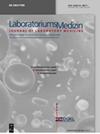脑前啡肽和S100B蛋白在颅脑外伤中的诊断价值
IF 0.1
Q4 OTORHINOLARYNGOLOGY
Laboratoriumsmedizin-Journal of Laboratory Medicine
Pub Date : 2017-07-26
DOI:10.1515/labmed-2016-0045
引用次数: 2
摘要
摘要背景:本研究的主要目的是探讨血清S100钙结合蛋白B (S100B)和proenkephalin (P-ENK)水平在外伤性脑损伤(TBI)脑损伤中的诊断价值。方法:我们前瞻性地收集急诊收治的58例颅脑损伤成年患者的血清血样。根据患者的临床表现和转归,测定血清S100B和P-ENK水平并进行比较。结果:脑损伤患者与对照组比较,S100B和P-ENK水平均有统计学意义。根据受试者工作特征(ROC)分析,血清S100B和P-ENK水平对有无脑损伤患者鉴别诊断的临界值分别为785.944 ng/mL和2.445 ng/mL。出院患者与死亡患者的S100B、P-ENK水平比较,差异均有统计学意义。结论:与对照组相比,TBI患者血清S100B和P-ENK水平升高。此外,与单发病变患者相比,多发病变患者血清中这两种标志物水平均升高。血清S100B和P-ENK水平也可作为TBI患者死亡率的预测指标。本文章由计算机程序翻译,如有差异,请以英文原文为准。
Diagnostic values of proenkephalin and S100B protein in traumatic brain injury
Abstract Background: The primary aim of this study was to investigate the diagnostic values of serum S100 calcium-binding protein B (S100B) and proenkephalin (P-ENK) levels in brain damage caused by traumatic brain injury (TBI). Methods: We prospectively collected serum blood samples of 58 adult patients admitted to our emergency department due to TBI. Serum S100B and P-ENK levels were measured and compared according to clinical findings and outcomes of the patients. Results: When patients with brain injury were compared to controls, statistical significance was determined in both S100B and P-ENK levels. According to the receiver operating characteristic (ROC) analysis, cut-off values for serum S100B and P-ENK levels for the differential diagnosis of patients with and without brain damage were found to be 785.944 ng/mL and 2.445 ng/mL, respectively. There was a statistical significance in both S100B and P-ENK levels when patients who were discharged and those who died were compared. Conclusions: Serum S100B and P-ENK levels are found to be elevated in patients with TBI when compared to controls. Additionally, serum levels of both markers are found to be elevated in patients with multiple lesions when compared to patients with a single lesion. Serum S100B and P-ENK levels may also be used as predictors of mortality in patients with TBI.
求助全文
通过发布文献求助,成功后即可免费获取论文全文。
去求助
来源期刊

Laboratoriumsmedizin-Journal of Laboratory Medicine
MEDICAL LABORATORY TECHNOLOGY-
CiteScore
0.80
自引率
0.00%
发文量
1
审稿时长
>12 weeks
期刊介绍:
Information not localized
 求助内容:
求助内容: 应助结果提醒方式:
应助结果提醒方式:


